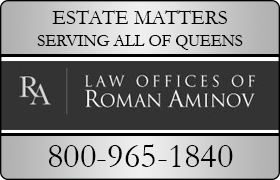Carle Place Wills & Probate Lawyer, New York
Sponsored Law Firm
-
 x
x

Click For More Info:
-
The Law Offices of Roman Aminov
147-17 Union Turnpike Flushing, NY 11367 » view mapElder Law, Probate, Estate Planning Free Inital Phone Consultation
The Law Offices of Roman Aminov is a client centric trusts and estates practice concentrating in estate planning, elder law, and probate.
800-965-1840  Roman Aminov
Flushing, NY
Roman Aminov
Flushing, NY Attorney At Law - New York, 2011
 Testimonials
Testimonials"Roman went out his way to help me. He made several attempts to contact me."
 Contact UsEmail or Call 24/7
Contact UsEmail or Call 24/7Call for free initial consultation,
800-965-1840.
Includes: Estate Administration, Living Wills, Wills
Lawrence Neal Berwitz
✓ VERIFIEDLawrence N. Berwitz has been practicing law since 1980. He is a graduate of St. John’s University School of Law (1979) and earned his bachelor’s ... (more)
John Virdone
✓ VERIFIEDAudrey Lee Jacobs
✓ VERIFIEDAudrey Jacobs is an experienced attorney who has been practicing law since 1992.
Judith B Raskin
Robert M. Rosen
FREE CONSULTATION
CONTACTFREE CONSULTATION
CONTACTJasleen Kaur Anand
Elihu I. Rose
Matthew K. Tannenbaum
FREE CONSULTATION
CONTACT

 Testimonials
Testimonials Contact UsEmail or Call 24/7
Contact UsEmail or Call 24/7



